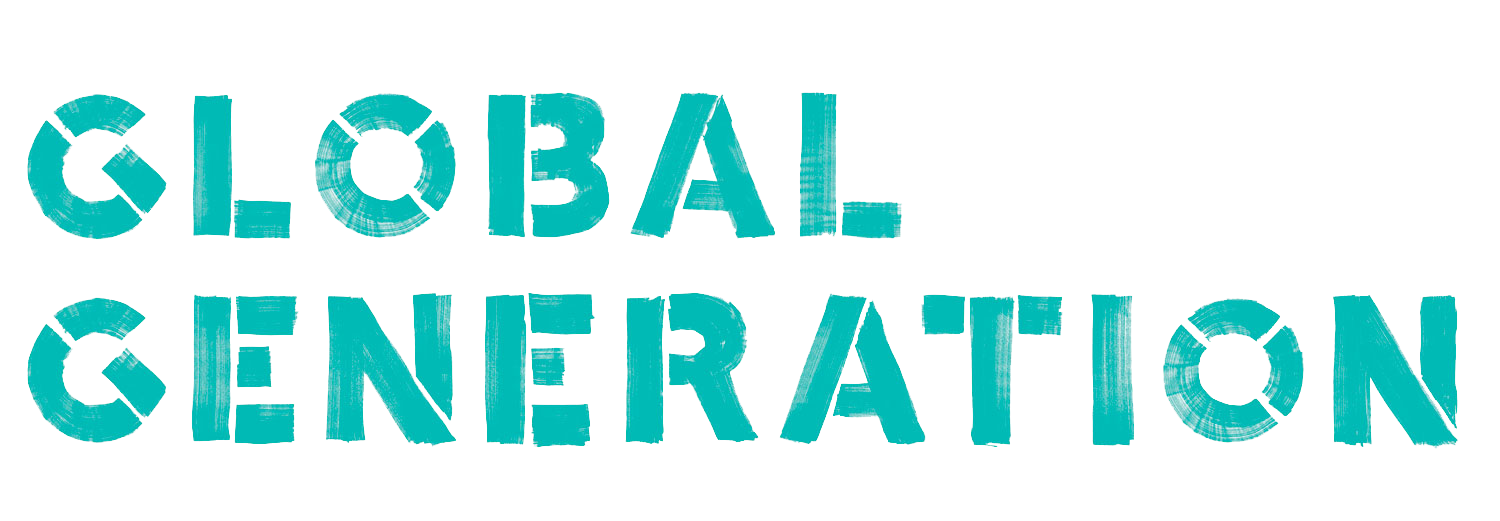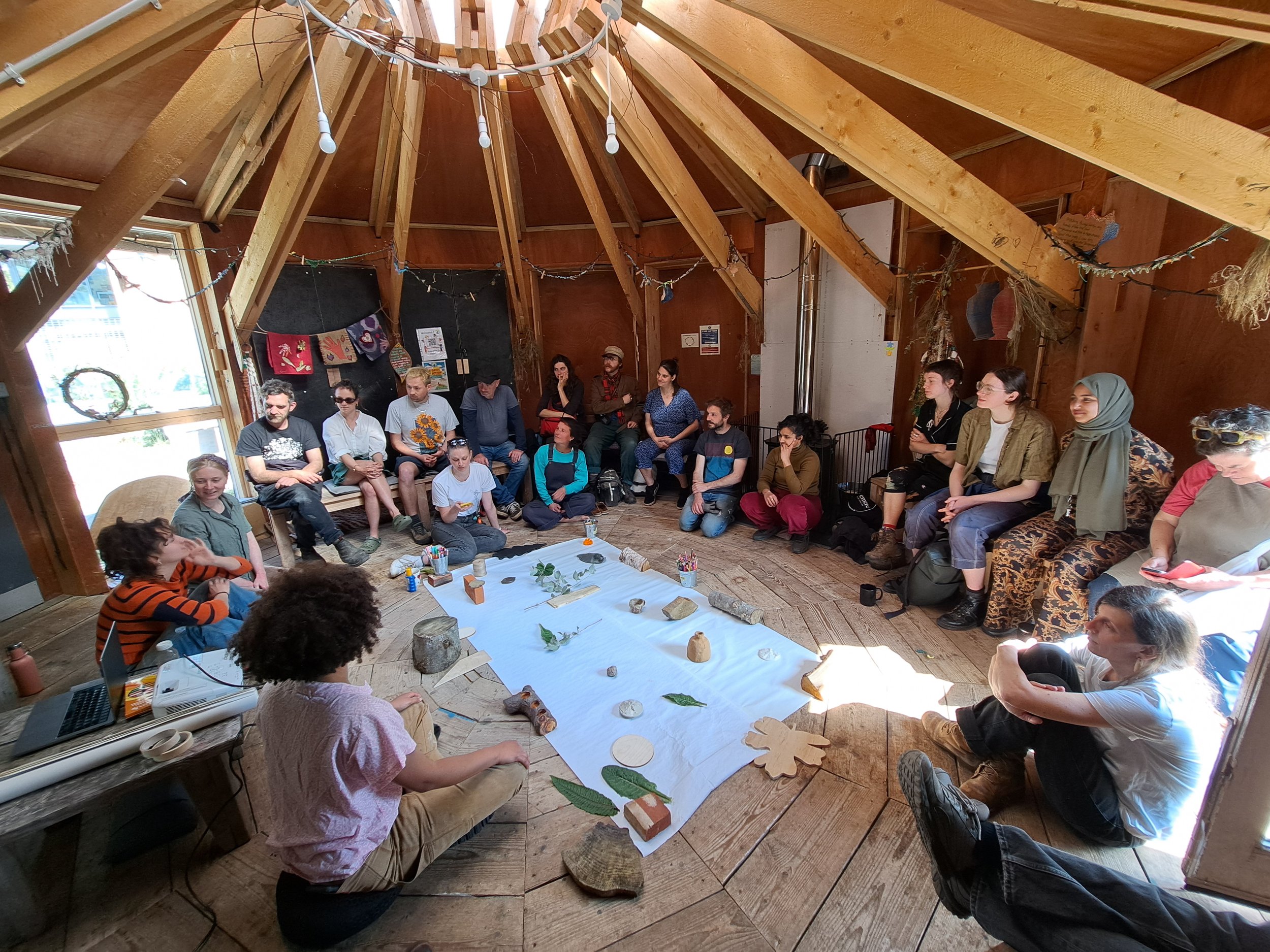PASSING THE BATON
It’s early evening and I am sitting by the door in the Story Garden classroom as I listen to the words; “feel your feet on the ground, feel your breath, find a way to sit very still.” I feel my heart pounding and I focus on the words, my body, the feeling in the room. As the simple and gentle instructions keep coming, the room drops into a shared space of silence and I relax. Maedeh, one of the young people who has been involved with Global Generation for six years or more, is leading a reflective part of a training session for a group who have been doing a short course in food growing and organic gardening. This is no ordinary event, it is the first time Maedeh has led one of our action research rituals for a group of adults. From a place of silence she leads the group into the practice of free fall writing; “don’t worry about your spelling or your punctuation, don’t read over your words as you are writing, describe how you felt, just let yourself go free… here is a start line.” A few days later, a recording of some of the feedback from the group was played by Hallie; the Senior Gardener at the Story Garden, as an inspiration for our weekly update meeting.
Through a late-in-life academic journey I came across the world of action research; an approach that has shaped what I have brought to Global Generation’s work over the last ten years or more. Colleagues have joined me in this endeavour and now as the next generation, who have grown up through GG’s programmes find their own ways of inviting others to feel, articulate and share more of their experience, I have the feeling that we are passing the baton. We have often said that our gardens are gardens of a thousand hands and that our practice builds relationships between different people and between all of us and the natural world; in that sense it is the work of many hearts and minds as well.
A persistent question for me in my work with Global Generation has been; what gives people the heart to care and make the effort to do things differently… to stand with our eyes open and creatively contribute to a world that is seemingly falling apart? In the midst of so much uncertainty is it possible to step back and appreciate the wonder of who we are and care for what we are a part of?
Action research has been a way of living into this question. Over the years I have seen how this collaborative approach to inquiry has helped many of the young people we have worked with find words for that intangible dimension of life that carries with it a sense of meaning and purpose; rooting them to whatever ground they stand on. As they give voice to their experience their words have given permission to others of all ages, to bring more of their humanity into what can all too easily become a superficial and somewhat mechanical process of ‘delivering outcomes’. That being said, what this broad church attitude to inquiry actually is, can seem vague and often confusing. In short, action research (for GG at least) involves lots of different and often arts based ways of knowing. This has included ‘free fall’ journaling, personal and mythical story-telling, poetry, art, peer to peer interviews, dialogue and discussion along with fast and slow invitations into photography, finding things in the garden that speak to us, making mandalas in the wood chip covered car parks that most of gardens once were and more. Contrary to the academic notion of an objective authorless text, the words that come are usually pretty personal, with all of the colour and texture of the places in which encounters occur. One could say that action research is a way of slowing down and thinking for ourselves about everyday things more deeply.
As much as a practice tool, action research can also be a rich and effective evaluation tool. Embedded within poetic writing, tiny noticings and passing comments can be clues to what really happened, how did we feel about it? What were the bumps and the breakthroughs? What unexpected twists and turns happened? This subjective way of reflecting on projects, runs counter to the recommendation that evaluation should be objective and free from bias. Recently I struggled with the fact that one of our largest funders stated that “a project officer is not the best person to gather data as they are fully immersed in the project and unlikely to be as objective as someone who is not so heavily involved.” It was a worthwhile challenge to speak upwards and describe why we curated the creative outpourings of the project ourselves. One of my mentors, Judi Marshall, points out that in first person action research, objectivity is not an option; instead one seeks to develop a critical subjectivity. Over the last few years we have given local people, especially young people like Maedeh a platform to express what happens in their encounters with plants, to find their own way to become The Voices of the Earth. A catalyst for this was a Heritage Lottery Funded project that sought to democratise the heritage often held by institutions and it was encouraging for our participants to know that their words were taken seriously:
“Global Generation’s participatory approach has enabled us to encounter new perspectives and voices, and the commitment to the themes of storytelling, nature and community have really helped us to deepen our own understanding, not just of the stories and lived experiences of those involved but also of the collections we look after and buildings we steward for future generations.”
— Roly Keating, CEO British Library
“Hearing the audios made me feel proud of myself as a young woman, proud of my generation who can still do positive things and proud of all the people who were involved in the project and supported us in this adventure. I thought how far we have come as a group with our creative expression and the sharing of our ideas. The anthology is the kind of book I want to read, a book with personality and personal stories. The pages are like we are in this project.”
— Lucy Shiekh, Voices of the Earth Fellow
In this tapestry of weaving words into lived experiences colleagues and I have, for the most part, avoided issuing meaningless forms created by others. We have found different ways to do our own evaluation and have involved participants as co-researchers. Now we are taking the exciting step of supporting our participants to take a lead in the research process, both on our own projects and those of our friends and partners, like The Listening Space at the Caversham GP practice. As with Maedeh, who began the session with her own freefall writing, the invitations we offer and the hope for the words that might come are intentionally evocative and not neutral. In that sense we travel hopefully and transparently in the knowledge that words can offer a timeless and precious glimpse of an endlessly unfolding creative story that we are all a part of.








It’s a beautifully golden afternoon in late October, and I am sitting in Somers Town on a table outside the pub, admiring the seven foot sunflowers that are growing opposite the medical centre.